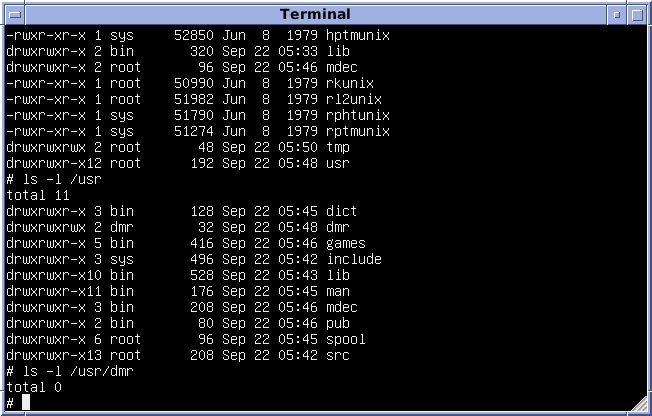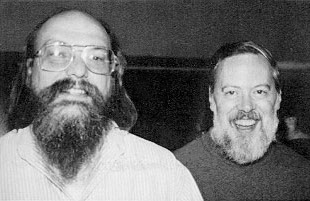UNIX
An Alternative to Multics

Multics (Multiplexed Information and Computing Service) was a time-sharing operating system developed at Bell Laboratories. Ken Thompson and Dennis Ritchie were among a few who worked on the project. In the year 1969, Bell Labs decided to withdraw from the project and so a small team including Ritchie and Thompson wanted to find an alternative operating system which included the desirable features of Multics. Thus began the creation of UNIX.
The Rise of UNIX

The first edition of UNIX released in 1971 and was used on a DEC PDP-7. The power and flexibility of UNIX made it very popular and newer versions were released shortly after. A major breakthrough was made in the fourth edition of UNIX, in 1973 as it was now being written in C, making it portable (it could be installed into almost any computer and translated to the language used in that computer). UNIX was also, relatively cheap and this also fuelled its growth in popularity as an operating system.
In 1975, the UNIX version 6 was released and it was the first version that could be readily modified by the user. This version of UNIX used the Thompson shell, which would later inspire the interactive C shell. The Bourne Shell and C shell were popular features of the seventh edition UNIX, released in 1979 by Berkeley Software Distribution (BSD).
Variations and Open Systems
The XENIX is one of the most well known variations of the UNIX system and it was founded in 1980 by Microsoft. In the same year, BSD had released the fourth version of its own distribution of UNIX, called 4BSD. The 1980's was a time period when competition between different UNIX system products soared and as a result many new versions of UNIX with diffrent features were released in this time period. It was also during this time that AT&T and Bell Labs split, and so the UNIX system was once more divided into different variations.
The X/Open Company Ltd wanted to design open systems, which meet specific standards, which do not depend on the standards of the supplier. X/Open decided to use UNIX as the basis of its open systems and hence, UNIX was further popularised. In 1987, AT&T along with Berkeley founded the Open Software Foundation (OSF) which was another open system. During the late 1980's there was immense competition between suppliers of AT&T's UNIX System V and the OSF's variations of UNIX based open systems and by 1991, a new company was formed: UNIX System Laboratories. Around this period, early versions of Linux (an operating system based on UNIX) and Solaris (a version of UNIX for SPARC) were being developed.
External Links
- [Visited on 06/11/14] Early UNIX History
- [Visited on 06/11/14] Image taken from Wikimedia Commons.
- [Visited on 06/11/14] Image taken from Wikipedia
- [Visited on 06/11/14] UNIX Past
- [Visited on 06/11/14] Dennis Ritchie
- [Visited on 06/11/14] Open Systems
- [Visited on 06/11/14] UNIX Variations
- [Visited on 06/11/14] UNIX Basics
- [Visited on 06/11/14] Intel 8080